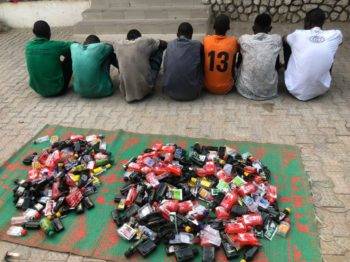On Wednesday, May 1, 2024, a group of suspected repentant Boko Haram insurgents unleashed chaos in the suburbs of Maiduguri metropolis. They stormed the National Drug Law Enforcement Agency (NDLEA) and the Nigeria Customs Service (NCS) checkpoints at Kasuwan Fara, chasing away the personnel on duty and setting ablaze all structures at the checkpoints.
The incident followed a fierce encounter between the repentant Boko Haram combatants and the police at the Kasuwan Fara Divisional Police Office. The suspected repentant insurgents, reportedly wearing military uniforms, had pounced on the police office to forcefully set free their eight colleagues arrested at the suburb over criminal activities bordering on dealing in hard drugs.
Crackdown on Criminal Activities Sparks Retaliation
The arrest of the eight suspected repentant insurgents was made on April 24 during a raid carried out by the police on the notorious Kasuwan Fara area, known for its high criminal activities and drug peddling. The area had been earmarked for closure by the Borno State Government due to the rise and persistence of criminal activities and sinister operations by drug peddlers comprising dismissed military personnel, repentant insurgents, and other hoodlums.
The April 24 raid, where the eight suspected repentant Boko Haram were arrested and 426 bottles of spirits, such as dry gin, were confiscated, was conducted to sanitize the area pending the final closure. The arrested persons were detained at the Kasuwan Fara police division since the day of their arrest.
Brazen Attack and Retaliation at Checkpoints
Subsequently, at about 7:40 am on Thursday, May 2, a dozen of the suspected repentant Boko Haram in military uniforms stormed the Kasuwan Fara police station in an attempt to rescue their arrested fellows. The Divisional Police Officer and his men were able to repel the attack, causing the perpetrators to flee.
Consequently, the assailants, in an apparent transfer of aggression, reverted to attacking the NDLEA and NCS personnel checkpoint along the Maiduguri-Gubio road at Kasuwan Fara, where they burnt down the checkpoints alongside the sandbags heaped on the road and fled the scene.
Investigations Underway as Authorities Vow Action
Borno Police Command spokesman, ASP Kenneth Daso, confirmed the incident, stating that investigations are ongoing to apprehend the attackers. He added that the arrested eight suspects have been transferred to the Anti-Crack Squad Div HQ for further action.
The brazen attack on the checkpoints and the subsequent retaliation by the suspected repentant Boko Haram have raised concerns about the security situation in the region and the threat posed by criminal elements operating under the guise of repentant insurgents.
Nigeria’s Controversial Approach to Repentant Boko Haram Terrorists
In recent times, Nigeria has been grappling with a contentious issue: the reintegration of repentant Boko Haram into society. Under the guise of rehabilitation, the Nigerian Army has initiated a program allowing former insurgents, who have reportedly committed heinous crimes including the killing of innocents and military personnel, to be released back into the community. This initiative has sparked widespread debate and raised serious concerns about national security and justice.
The Dangers of Embracing Repentant Boko Haram Terrorists
Many critics argue vehemently against the Nigerian Army’s lenient approach towards repentant Boko Haram. These individuals, once sworn enemies of the state, have blood on their hands and have actively participated in acts of violence and terror. Allowing them to rejoin society without facing appropriate consequences not only undermines the rule of law but also poses a significant threat to public safety. The fear is palpable among citizens who worry about the potential for these former insurgents to re-offend or even recruit others into their extremist ideologies.
Moreover, the notion of “repentant insurgents in military uniforms” strikes a chord of disbelief and outrage among many Nigerians. How can individuals responsible for unspeakable atrocities suddenly claim redemption and expect to be treated with compassion and support? The specter of ISIS affiliation only serves to heighten these concerns, with fears that releasing such individuals back into society could inadvertently bolster terrorist networks and jeopardize national security efforts.
A Call for Rethinking National Security Strategies
The debate over the reintegration of repentant terrorists underscores broader issues facing Nigeria’s security apparatus. While the government may argue that rehabilitation programs offer a path towards peace and reconciliation, critics contend that such initiatives overlook the gravity of the crimes committed and fail to prioritize justice for victims and their families. There is a pressing need for a comprehensive review of national security strategies to ensure that they strike a balance between rehabilitation and accountability, without compromising the safety and well-being of citizens.
The Nigerian Army’s approach to dealing with repentant Boko Haram raises critical questions about the country’s commitment to ending insecurity. By prioritizing leniency over justice, there is a risk of perpetuating cycles of violence and emboldening extremist elements. Moving forward, it is imperative for the government to heed the concerns of citizens and reassess its approach to rehabilitation and reintegration, with a focus on upholding the rule of law and safeguarding national security interests
Table of Contents
Discover more from OGM News NG
Subscribe to get the latest posts sent to your email.














